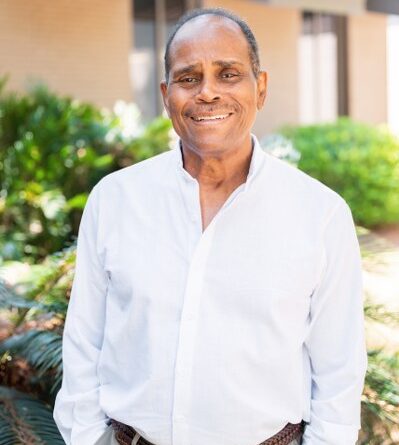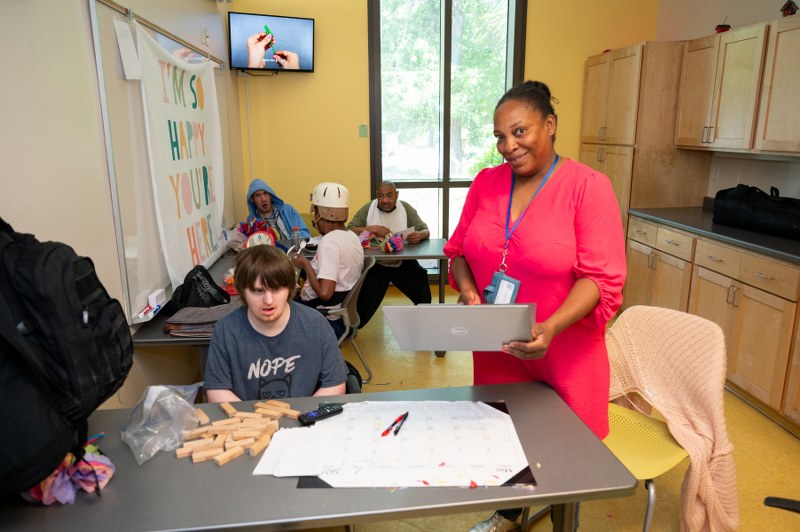Bill Love
ENSURING PEOPLE WITH SPECIAL NEEDS FEEL SPECIAL
story by JEANNE REYNOLDS photos by CHARLOTTE BERKELEY
 “I spent 30 years in prison.”
“I spent 30 years in prison.”
It’s the first thing Bill Love tells a new acquaintance about himself, and it’s true — in a way. Long before becoming executive director of Beaufort County’s Department of Disabilities and Special Needs, Bill worked for 30 years in adult corrections and juvenile justice in his home state of Pennsylvania, including an eight-year stint as deputy secretary for the Pennsylvania Department of Corrections.
Interacting daily with death row inmates while also teaching graduate school students in the criminal justice program at Pennsylvania State University taught him a critical life lesson.
MAKING FOOTPRINTS IN NORTH CAROLINA
That core belief followed Bill in a career change when he decided to move south, relocating to Lake Norman near Charlotte to start a business with two friends. The Footprints Carolina agency grew to serve more than 2,000 children and adults with developmental disabilities and mental health issues. Bill says he “fell in love” with that work. And just as with his former grad students, he saw a common thread between the prison and special needs populations.
“They’re both ignored and made invisible. We’ve taken away their voice,” he says. “It bothers me when people are hurt, when they feel they’re not part of something. It’s important to give people with disabilities a voice and visibility so they can contribute.”
The issue is more widespread than we might think, Bill explains, noting one in four Americans have a handicap of some type. “Anything that makes people look or feel different is a risk. It’s too easy to have a caste system if you don’t ‘look right’ or ‘live right.’ I’ve never understood why we treat people differently.”
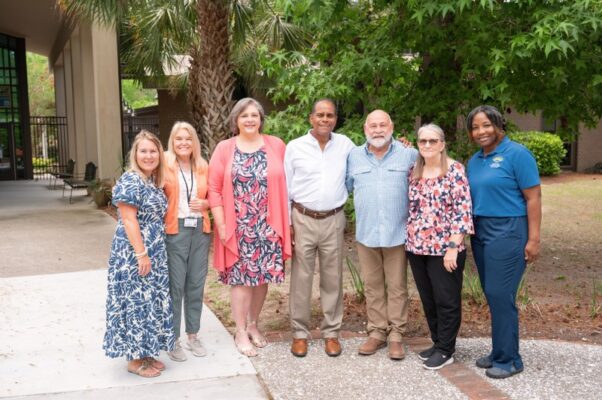
FIRSTHAND EXPERIENCE
Bill learned that lesson as a young child. His father, who owned a hotel and bar, and also worked in a steel mill, told him and his eight siblings to “work hard, study hard, save money, and treat people right.” But Bill was one of the “different” ones, born with an extra finger below the pinkie on his right hand.
“I wrapped my hand up so I could play football like the other boys — we had to play football — but I felt I couldn’t take full advantage of things,” he says. “I knew I was different.”
Surgery corrected the problem, leaving only a small external scar, although perhaps a trace lingers inside.
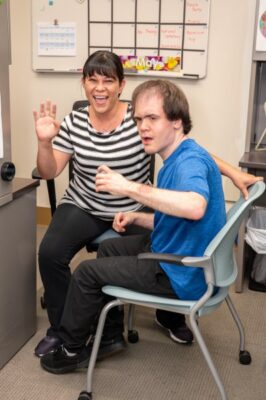
TAKING ON A NEW CHALLENGE
In 2005, Bill moved farther south to Beaufort County, settling on Dataw Island. It wasn’t long before he found a new way to continue his passion for serving people with special needs, joining the County’s Department of Disabilities and Special Needs. The department advocates for people with developmental disabilities and special needs, so they can live more productively and inclusively in the community, offering services including early intervention for young children, case management, a day program and employment opportunities for adults, and residential living. It’s the only disabilities agency in the state that is a county department, getting about a quarter of its funding from Beaufort County Council.
“Our county is great with this population,” Bill says. “I recognize and appreciate the support from the county council and administration.”
Bill started as director of the adult day program before moving into the executive director role in 2015. Since then, he’s played a key role in the agency’s growth, helping create its state-of-the-art service and administration center near Shell Point and the respite/after-school program, which provides families with activities and needed relief. Employment opportunities for the department’s clients have increased significantly under his leadership, and the residential program has established six additional facilities.
Still, it’s clear he doesn’t think his work is done.
“What I think about often are the ingredients in making people happy and what gets in the way. What can be taught in the schools, in the churches?” he says. “People tend to isolate themselves. They often don’t interact with those who are different from themselves, so they don’t learn. I can’t allow something small to interfere with something big.”
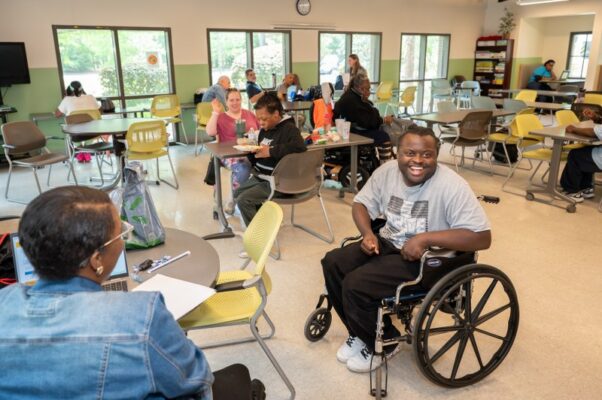
MAKING A DIFFERENCE
As much as Bill loves what he does, it’s far from all that keeps him busy well into his 70s. He’s the proud father of two grown daughters and grandfather of three boys and a girl. He’s also an avid exerciser, is taking both piano lessons and Spanish lessons, and attends church at the Unitarian Universalist Fellowship of Beaufort.
“I have to do things,” he says. “I’m driven.”
Bill says both his daughters also feel strongly about treating people right — another lesson he’s passed on to those around him.
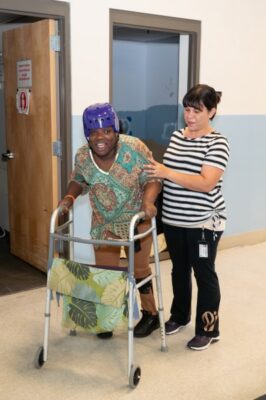
WHAT IS THE BEAUFORT COUNTY DEPARTMENT OF DISABILITIES AND SPECIAL NEEDS?
BCDSN advocates for individuals with developmental disabilities and special needs to live more productively and inclusively in the community. Services include early intervention for young children, case management, a day program and employment opportunities for adults, residential living that accommodates 44 individuals in 11 homes, supervised independent living for six additional individuals, and foster home care. The department serves more than 880 individuals and families, including case management for more than 770 people and early intervention services for more than 180 people.
BCDSN is the only disabilities agency in South Carolina that is a county department. That gives it much more flexibility and support than most other agencies, as well as additional oversight. Beaufort County Council funds about 25% of the department’s budget, supporting employee salaries and capital items. The remainder comes from South Carolina Medicaid, including 75% federal funds and 25% state funds.
The department’s programs and services include:
• Case Management — Case Management services are provided by trained professionals with knowledge of the medical, social, and educational services available. Case managers assess each individual’s specific needs to provide him or her with effective and appropriate resources, allowing the individual to remain in a community-based environment. Case management services include intake for eligibility categories (intellectual disability, related disability, high-risk infants, autism spectrum, head injury, spinal cord injury, or similar disability).
• Bright Beginnings Early Intervention — Bright Beginnings is an early intervention program offered within the home or in a day care setting to families with children from birth to six years who are developmentally delayed. This program provides service coordination and family training that address a child’s development, including language and communication, cognition, fine and gross motor development, social-emotional development, and self-help skills.
• Great Expectations Day Program — The Great Expectations Day Program helps to train and place individuals with disabilities in jobs created for them according to their abilities and desires. Qualified individuals may spend up to six hours per day in the program, Monday through Friday, where they have the opportunity to further develop and maintain daily living and employment skills. About two-thirds of people in the program are working in the community with starting pay of at least minimum wage.
• Health — The department supports the health care needs of its clients on a 24-hour basis. One full-time and one part-time registered nurse is available around the clock to provide required coordination of health care, manage nursing procedures, train and monitor staff engaged in health care-related activities, and advocate for and ensure optimal health outcomes for individuals in the residential and day programs.
• Residential Services — Residential Services support 50 people in several different living situations to accommodate their needs. The 11 community training homes each have four individuals living as a family unit with 24-hour staff support. In these homes, individuals learn everyday skills, such as cooking, cleaning, and independent living. Many have jobs during the day, and they’re encouraged to be involved in the community. The supervised living program allows six additional people to live in their own home with occasional staff support and training. One additional person lives in a foster care setting in a private home in the community with staff support and training.
• BCDSN Advisory Board — The Advisory Board advocates for the individuals the department serves, provides assistance and advice to staff on policy matters, and promotes community awareness of the department’s programs and services.
• ABLE Foundation — The ABLE Foundation is a strong supporting partner in the department’s service to people with developmental disabilities.

